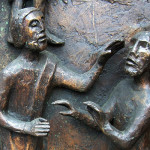We run our website the way we wished the whole internet worked: we provide high quality original content with no ads. We are funded solely by your direct support. Please consider supporting this project.

The Cross and Cosmic Warfare
Since the time of Anselm in the 11th century, Western theology has focused almost all of its attention on the anthropological dimension of the atonement. In the most popular understanding, the chief thing that God was accomplishing on the cross was satisfying God’s perfect justice and thereby atoning for our sins. The work of the cross was centered on us.
While this is significant, I maintain that this anthropological aspect of Christ’s death and resurrection is rooted in something more fundamental and broad that God was aiming at: to defeat once and for all his cosmic archenemy, Satan, along with the other evil powers under his dominion.
In other words, while most tend to see the atonement primarily in terms of what was accomplished for humanity and view what it accomplished against Satan and evil powers as a byproduct, I espouse that the New Testament actually construes the relation between these two aspects of the cross in converse order. Christ’s victory on the cross is first a cosmic event—it defeats Satan.
The foundational reason Christ appeared was “to destroy the works of the devil” (1 Jn 3:8), to disarm “the rulers and authorities” (Col 2:15), and to “destroy the one who has the power of death, that is the devil” (Heb 2;14). The consequence of this victory is that he is seated on his rightful throne, the whole cosmos is liberated from a tyrannical and destructive ruler, and humanity is delivered “from the power of darkness and transferred … into the kingdom of his beloved Son (Col 1:13).
While Christ’s substitutionary death for sinful humans is central for understanding what Christ did for us, this dimension of Christ’s work is possible only because of the broader cosmic victory Christ won on the cross.
I believe that giving this cosmic perspective priority is crucial. I say this because it gives us a biblical understanding of evil. One of the features of Western thought that has most handicapped our efforts to reconcile the existence of evil with a belief in an omnipotent and omnibenevolent God is that we have tended to understand evil—and its solution of the cross—anthropologically and individualistically. Many theologians have traditionally explained cosmic evil be appealing to human wills alone, and have attempted to understand the significance of the cross by appealing to human salvation alone.
From a NT perspective, the existence of evil far outruns what many who appeal to human willing is capable of explaining. And in the same vein, the significance of Christ’s work on the cross far outruns what it accomplishes for human beings.
Within a warfare worldview, neither evil nor its cure is first and foremost about human beings at all. Rather, it is, primarily about free willing agents (something I label as “the powers” in my writings) whose cosmic power and influence dwarf the free agency of human beings.
The central means by which God defeated these powers was by dying on the cross and rising from the dead. The cross was a cosmic event that defeated the enemies of God, enthroned the Son of God, and thereby in principle liberated the whole cosmos from its bondage to an illegitimate evil ruler.
Contrary to the dominant understanding of the atonement, Jesus’ death and resurrection was not simply, or even primarily, about God reconciling humanity to himself, though this was part of it. Rather the cross accomplishes individual salvation and all else that pertains to it because it is first about God’s cosmic victory.
—Adapted from God at War, pages 240-249
Photo credit: Digital Sextant via Visual hunt / CC BY
Category: General
Tags: Atonement, Christus Victor, Salvation, Spiritual Warfare, Warfare Worldview
Topics: Spiritual Warfare, Cosmic Conflict
Related Reading

What To Do with the Bible’s Talk of Satan
Recently, Roger Olson raised the question on his blog about why Satan is ignored in modern theology. He observed how Greg’s theology takes an “obvious, ‘up front,’ blatant belief in a very personal, very real, very active Satan who has great power in the world.” Because we often have so little to say about Satan…

Good From Evil
The Bible is very clear that God has nothing to do with evil. There is “no darkness” in God. (I Jn 1:5). Far from intentionally bringing about evil, God’s “eyes are too pure to look on evil” (Hab. 1:13). All evil, therefore, must be ultimately traced back to decisions made by free agents other than…

Frank Viola’s Interview With Greg: OT Violence and the Spirit World
I have not yet personally met Frank Viola, but over the last several years we’ve conversed and debated a good deal, to the point that I consider him a good friend. He is one of those all-too-rare types of people who is solidly grounded in the Word and yet who is not enslaved to traditional…

Civilian or Soldier: Which Are You?
The Bible makes it clear that the people of God are to be on the offensive in storming the gates of hell (See post) and that Christians are to put on the armor of God (See post). However, in modern Western Christianity, it is much more common to behave more like civilians on a vacation than…

Why Doesn’t God Heal When We Ask?
If we are called to manifest what Jesus manifested and revolt against what Jesus revolted against, and Jesus carried out the kingdom through healing, then why doesn’t God heal those we pray for? One of my personal kingdom heroes is a Vietnamese lady named Dr. Huyen Tranberg. She is a medical doctor who works with…

Are you Afraid of Demons?
I remember learning about germs in fourth grade. We were told our world was saturated with tiny invisible creatures that can infect wounds and make us sick. I immediately stopped sharing already-chewed gum with other kids, stop using my sister’s toothbrush and started washing my hands after going to the bathroom. Most kids had similar…
